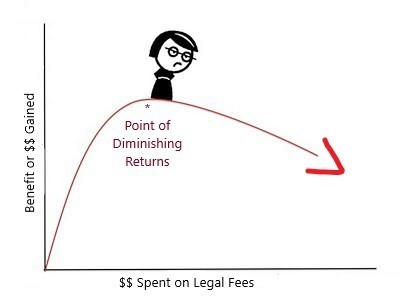The Law of Diminishing Returns
Aug 31 2018 - Posted by Chris Lincoln of The Lincoln Law Firm, PLLC, in Assets, Divorce, Financial Challenges, Property Division
One of the worst financial decisions in a divorce is to spend more on attorney’s fees than your divorce is “worth”; similar to paying $5,000.00 to fix an engine on your used car worth $3,000.00. The law of diminishing returns refers to a point at which the level of profits or benefits gained is less than the amount of money or energy invested. While the law of diminishing returns may seem black and white, with the emotions which emanate from divorce, it is imperative to not let your feelings towards your soon-to-be-ex-spouse negatively impact your financial future.
The key to being financially savvy in spending money on legal fees during a divorce is not to spend more on legal fees than the amount of money or benefit gained as a result of the legal fees paid. A conscientious attorney will always evaluate the amount of benefit to be gained compared to the amount of legal fees expanded to achieve the benefit; for example, an attorney could incur $3,000.00 in attorney’s fees only to add an additional $500.00 to a client’s settlement – probably not the best use of $3,000.00.
The law of diminishing returns is not to say that you shouldn’t spend money on legal fees; it is to say you should spend wisely and consider the benefit from the money spent. To explain it, here are a few examples:
- Client “Jim” – Jim and his wife were married 22 years, and both had equal access to the parties’ finances. Jim’s wife’s attorney sent discovery requests for the production of the parties’ financial documents. The parties spent exorbitant amounts in legal fees exchanging documents they had both already seen and had equal access to. Financial gain – $0.00. Financial loss $10k.
- Client “Ann” – stay-at-home mother of 3 young children. Husband was salaried at $90k annually. Ann was determined to prove that her husband was hiding money. Ann had access to the parties’ financial information and it was obvious, that with 3 young children and only one spouse working, all their money was accounted for in household bills and living expenses. The parties accrued credit card debt and had no savings. Ann insisted on increasing legal fees to find this “hidden” money that did not exist.
- Client “Marie” – Marie and her husband had separate bank accounts. Husband takes care of most of the finances, which she had been fine with. Marie’s husband makes approximately 3x more than Marie. Marie’s husband presented her with a proposed decree with no supporting financial documentation. His proposal was for each party to keep the bank accounts and retirement accounts in their own names and he keep the house and equity. He would “buy her out” of the house for $20k, again with no supporting documentation of how much equity was actually in the house. Marie did not have any extra money to spend on attorney’s fees, but was able to borrow from a family member. After Marie and her attorney propounded discovery to husband, Marie realized her husband was proposing an 85/15 split of the estate in his favor. Since she was not aware of the parties’ finances; she had no way of knowing what a bad “deal” she would have been receiving. Was it worth spending the legal fees to gain knowledge of the parties’ estate in order for Marie to receive a 50/50 split of the estate? In Marie’s case, very much so.
This is a time when you need to look deep into yourself and ask, “am I going to increase my legal fees out of spite and anger towards my spouse, or are increased legal fees necessary to protect my children?” It is always easier said than done, which is why the law of diminishing returns is not black and white. Sometimes you need to step back and look from the outside at all aspects of your situation. Ask yourself, “am I going to experience any benefit after my divorce, maybe years later when I am financially diminished?” Will it have been worth taking your spouse, and yourself, to the cleaners in legal fees?
You should choose an attorney whom you trust; he or she should understand your financial situation as well as your desires for your financial future. You will need resources to start the next chapter of your life after divorce.
Share This


